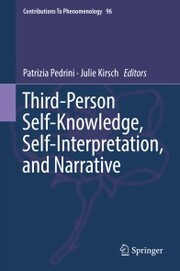<p></p><p>This volume answers questions that lead to a clearer picture of third-person self- knowledge, the self-interpretation it embeds, and its narrative structure. Bringing together current research on third-person self-knowledge and self-interpretation, the book focuses on third-person self-knowledge, and the role that narrative and interpretation play in acquiring it. It regards the third-personal epistemic approach to oneself as a problem worthy of investigation in its own right, and makes clear the relation between third-person self-knowledge, self-interpretation, and narrative capacities.</p><p>In recent years, the idea that each person is in a privileged position to acquire knowledge about her own mental states has come under attack. A growing body of empirical research has cast doubt upon the existence of what philosophers call first person self-knowledge, i.e., knowledge about our mental states that is often thought to be immediate, transparent, and authoritative. Thisline of thought has led some philosophers to claim that what seems to be first-person self-knowledge is really just third-person self-knowledge, i.e., knowledge about our mental states that is inferential, opaque, and fallible. This book discusses challenges for first-person knowledge and explores the true nature of third-person knowledge.</p><p> </p><br><p></p>
Patrizia Pedrini is Fixed-term Research Fellow at the Department of Letters and Philosophy, University of Florence, Italy. She is habilitated as Associate Professor in Theoretical Philosophy. Her main research interests range fromphilosophy of mind, philosophy of psychiatry, moral psychology, to epistemology. She is the author of two monographic books in Italian, one on self-knowledge (Prima persona. Epistemologia dellautoconoscenza, Pisa, ETS, 2009) and one on self-deception (Lautoinganno. Che cosè e come funziona, Roma-Bari, Laterza, 2013). She wrote articles in Italian and English on topics at the boundaries between philosophy, psychology, psychiatry, moral psychology, epistemology. Her recent publications include Rescuing the Loss-of-Agency Account of Thought Insertion (Philosophy, Psychiatry,& Psychology, 2015, with replies to commentaries). She is currently working on an authored book in English on self-deception.Julie E. Kirsch is an assistant professor of Philosophy at DYouville College in Buffalo, New York. Her current research focuses upon self-knowledge and the ethics of belief and memory. She became interested in these problems after investigating the nature and ethics of self-deception in her earlier work. Her recent publications include Is Abortion a Question of Personal Morality? (2013), Narrative and Self- Deception in La Symphonie Pastorale (2012), When Is Ignorance Morally Objectionable? (2011), Maladies of Fantasy and Depth (2009), and Whats So Great about Reality? (2005).
Introduction, by Patrizia Pedrini and Julie Kirsch.- Chapter 1. Self-Knowing Interpreters vs. Self-Knowing Subjects, by Annalisa Coliva.- Chapter 2. Self-Defence and Self-Knowledge: Truth and Interpretation in Psychoanalysis, by Michael Lacewing.- Chapter 3. Self-Interpretation, Narrative, and Intersubjectivity, by Shaun Gallagher.- Chapter 4. Knowing Our Minds: What and How?, by Daniel Hutto and Patrick McGivern.- Chapter 5. Introspection, Introjection and Interpersonal Understanding: The Phenomenological Approach, by Dermot Moran.- Chapter 6. Hermeneutics, Third-Person Self-Interpretation, and Narrative, by Bruce B. Janz.- Chapter 7. How do Narratives Spin the Self? Implications for Self-Knowledge, by Serife Tekin.- Chapter 8. Self-Interpretations as Software: Toward a New Understanding of Why False Self-Conceptions Persist, by Tad Zawidski.- Chapter 9. Interpreting Intuitions,; by Neil Van Leeuwen and Marcus McGahhey.- Chapter 10: Interpreting Things Past, by Julie Kirsch.- Chapter 11: Close Cover: Practical Knowledge and Retrospective Assessment, by Carla Bagnoli.- Chapter 12: Self-Knowledge, Mental Time Travel, and Agency, by Luca Malatesti and Filip Cec.- Chapter 13: Alienation, Identification, and Self-Knowledge, by Matthew Parrott.- Chapter 14: Conceptualizing of Ones Inner Experience, by Patrizia Pedrini.- Chapter 15: Extended Knowledge and Self-Knowledge, Duncan Prichard and Adam Carter.
„E-Book“ steht für digitales Buch. Um diese Art von Büchern lesen zu können wird entweder eine spezielle Software für Computer, Tablets und Smartphones oder ein E-Book Reader benötigt. Da viele verschiedene Formate (Dateien) für E-Books existieren, gilt es dabei, einiges zu beachten.
Von uns werden digitale Bücher in drei Formaten ausgeliefert. Die Formate sind EPUB mit DRM (Digital Rights Management), EPUB ohne DRM und PDF. Bei den Formaten PDF und EPUB ohne DRM müssen Sie lediglich prüfen, ob Ihr E-Book Reader kompatibel ist. Wenn ein Format mit DRM genutzt wird, besteht zusätzlich die Notwendigkeit, dass Sie einen kostenlosen Adobe® Digital Editions Account besitzen. Wenn Sie ein E-Book, das Adobe® Digital Editions benötigt herunterladen, erhalten Sie eine ASCM-Datei, die zu Digital Editions hinzugefügt und mit Ihrem Account verknüpft werden muss. Einige E-Book Reader (zum Beispiel PocketBook Touch) unterstützen auch das direkte Eingeben der Login-Daten des Adobe Accounts – somit können diese ASCM-Dateien direkt auf das betreffende Gerät kopiert werden.
Da E-Books nur für eine begrenzte Zeit – in der Regel 6 Monate – herunterladbar sind, sollten Sie stets eine Sicherheitskopie auf einem Dauerspeicher (Festplatte, USB-Stick oder CD) vorsehen. Auch ist die Menge der Downloads auf maximal 5 begrenzt.






